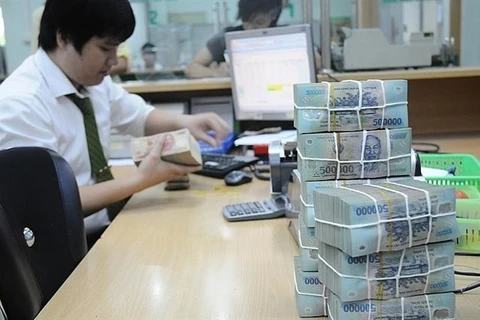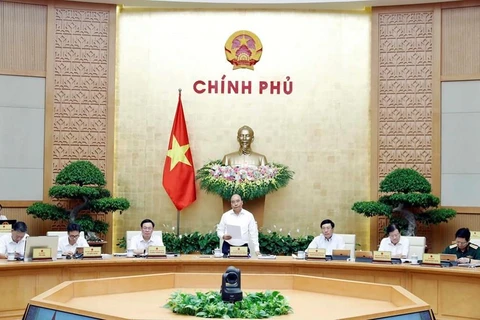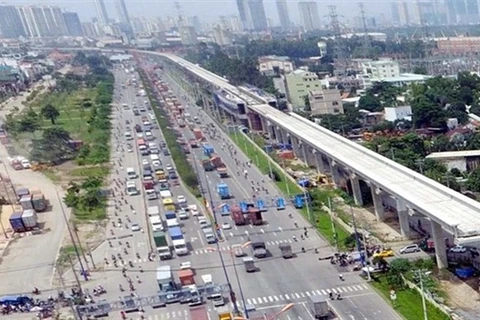 A teleconference on State budget collection and spending in 2019 between the Ministry of Finance and localities takes place on December 31 (Photo: Organisers/VietnamPlus)
A teleconference on State budget collection and spending in 2019 between the Ministry of Finance and localities takes place on December 31 (Photo: Organisers/VietnamPlus) Hanoi (VNA) – State budget collection made up 25 percent of the national gross domestic product (GDP) in 2019, with tax and fee accounting for 21 percent, the Ministry of Finance reported.
As of 12:00 on December 31, total State budget collection approximated 1.54 quadrillion VND (66.55 billion USD), exceeding the estimate by 9.1 percent (128.1 trillion VND) and up 82.1 trillion VND as compared with the report to the National Assembly.
The figures were unveiled by the Ministry of Finance during its teleconference with localities on State budget collection and spending in 2019 held in Hanoi on December 31.
State budget collection accounts for 25 percent of GDP
According to the ministry’s report, domestic collection reached 1.26 quadrillion VND, surpassing the estimate by 7.4 percent, with 55.9 trillion VND from crude oil, 25.3 percent more than the target, and export-import activities increasing 18.8 trillion VND.
In the year, State budget collection made up 25 percent of the national GDP, with tax and fee accounting for 21 percent.
Minister of Finance Dinh Tien Dung said with the close instruction of the Government and the Prime Minister, and the involvement of the entire political system, socio-economic development targets were accomplished.
According to the minister, State budget collection reached 24.9 percent of the GDP (surpassing the target of 23.5 percent). Besides, central budget collection accounted for 55 percent of the total, and local collection was 45 percent.
Notably, domestic budget collection expanded from 68.9 percent in 2016 to 81.9 percent in 2019 and is expected to hit nearly 84 percent this year.
Most of localities overfulfill budget estimates
Both central and local budget revenues exceeded the estimates, with central budget collection exceeding the plan by 4 percent (32.2 trillion VND), and local budget revenue, 16 percent (96 trillion VND).
Most of the localities overfulfilled the domestic budget collection estimates, with the most outstanding performers being Ninh Binh, Bac Giang, Binh Dinh and Phu Yen provinces.
Nguyen Duc Chung, Chairman of the Hanoi People’s Committee, said the capital city competed 22 socio-economic development criteria. It has instructed departments and agencies to closely coordinate with tax and customs agencies in budget collection, he added.
Last year, Hanoi recovered nearly 9.3 trillion VND of tax debts, and saved 2.58 trillion VND from regular budget spending, he said, adding that the city’s regular spending has been cut down by 11.81 trillion VND over the past four years.
Vice Chairman of the Ho Chi Minh City People’s Committee Tran Vinh Tuyen said local authorities have called for efforts of the entire political system to complete socio-economic targets.
Thanks to such efforts, the locality’s total budget collection hit 409 trillion VND in 2019, including 108.8 trillion VND from exports.
Meanwhile, its budget expenditure was 70.93 trillion VND, completing more than 80 percent of the estimate, including around 31 trillion VND or 95.7 percent for development investment, and 36.79 trillion VND for regular spending. The rate of disbursement was 94 percent.
These outcomes have created momentum for implementation of 2020 tasks as well as finance-budget targets for 2016-2020, thus contributing to materialising socio-economic targets set for the period.
Speaking at the conference, Deputy Prime Minister Vuong Dinh Hue pointed to difficulties and challenges Vietnam would face in 2020.
Given this, the financial sector needs to continue implementing fiscal policies closely and combine them with monetary policies to support domestic production and businesses activities, he said.
In addition, the sector should step up administrative reform, contributing to improving the business environment, while encouraging start-ups and promote business development, the Deputy PM added./.























